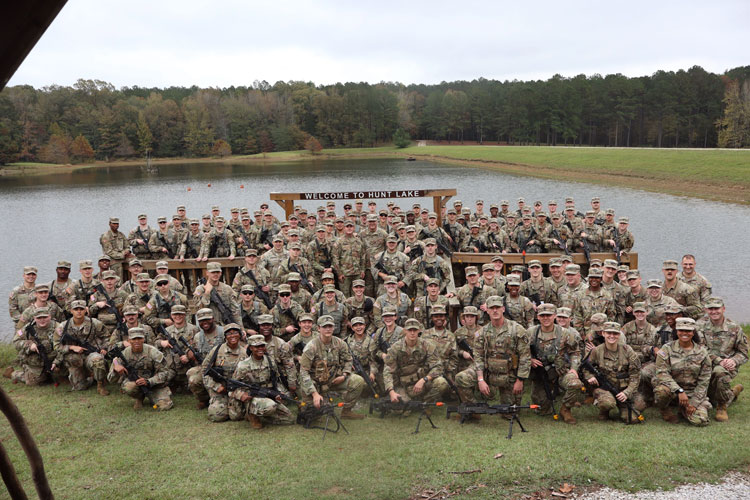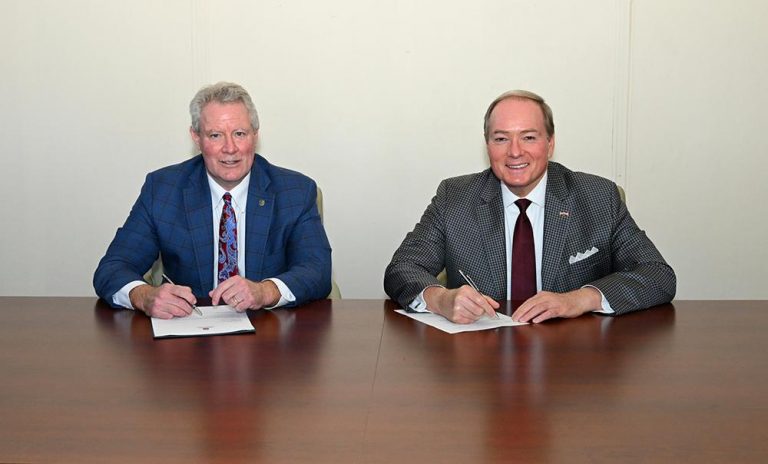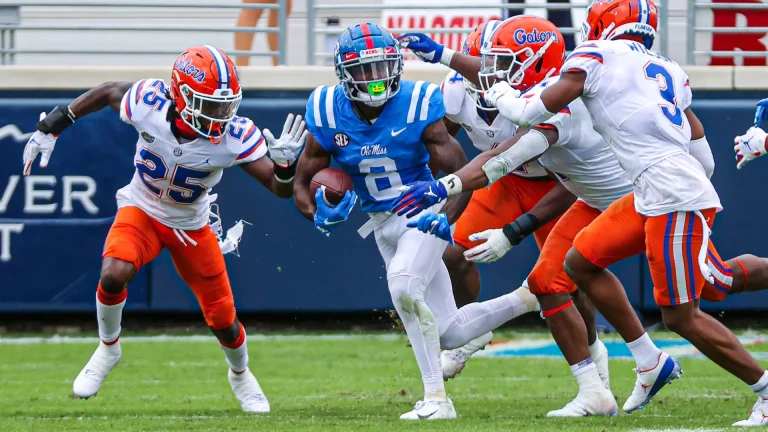
Former U.S. Sen. Trent Lott (left), Dr. Deborah Birx, former Mississippi Gov. Haley Barbour, former Pennsylvania press secretary Paul Critchlow and former White House Chief of Staff Sam Skinner discuss the challenges and lessons of leadership through crisis and national tragedy at the Gertrude C. Ford Center for the Performing Arts. The panel was hosted by the Army Heritage Center Foundation and the BGR Group and coordinated by the university's Trent Lott Leadership Institute. Photo by Thomas Graning/Ole Miss Digital Imaging Services
Panel discusses leadership through tragedy, crisis at Ford Center event
Five state and national leaders shared lessons from their struggles and successes of leadership in crisis Thursday evening September 14, 2023, at the University of Mississippi‘s Gertrude C. Ford Center for the Performing Arts.
With former Senator Trent Lott moderating, former Mississippi Governor Haley Barbour joined Dr. Deborah Birx, former director of the Centers for Disease Control and Prevention‘s Division of Global HIV/AIDS; Paul Critchlow, former press secretary to Pennsylvania‘s governor; and Sam Skinner, former U.S. secretary of transportation and White House chief of staff, for “Follow Me: Citizens, Soldiers and Crisis Leadership.”
During their service, the panelists have faced national and international tragedies such as the COVID-19 pandemic, Hurricane Katrina, the Exxon Valdez oil spill of 1989 and the 1979 meltdown of the Three Mile Island nuclear reactor.
“My motto for leadership is, ‘Always ride to the sounds of the cannons – wherever there’s a problem, go there,'” Lott said. “Let the people see you. Make sure you understand the magnitude of the crisis you’re facing.”
Each of the panelists had in some way followed that advice during their responses to national or regional tragedies. Birx traveled to almost every state during the COVID-19 pandemic, speaking with doctors, patients and family members. Barbour spent much of the time following Hurricane Katrina on Mississippi’s Gulf Coast assessing damage and speaking with citizens who had lost everything.
That first step – understanding the problem – is key to maintaining communication and relationships with those affected by crisis, Skinner said.
“What you do learn is you immediately have to keep people informed of what’s going on,” he said. “You have to be on the scene. Everybody involved has had a traumatic event in their life, and they need to know that you’re there for them.”
While maintaining communication, it’s important to remain flexible, to change as the situation demands, the leaders said. Preparations – like those Mississippians had made for each major hurricane following Hurricane Camille‘s disastrous path through the South in 1969 – can fail, and leaders must be ready to change the plan if they do, Barbour said.
“The problem is we didn’t prepare for the right hurricane – we prepared for Camille,” he said. What you learn is the more you prepare, the better off you’re going to be, even if you made the wrong decisions. That’s what happened to us.
“It (Hurricane Katrina) was the worst natural disaster in American history at the time. All of us Mississippians know how bad it was. We adjusted from that plan almost immediately, and I think had a pretty reasonably good reaction.”
After the response and first aid have ebbed, lasting change must be made, the panel advised.
Following the Three Mile Island meltdown, the United States passed sweeping legislation to tighten restraints on nuclear power plant operations. After Hurricane Katrina, Congress made FEMA a distinct agency in the Department of Homeland Security, hoping to bolster aid in future disasters.
But no lasting change has come in the wake of COVID-19, a problem Birx warns will cause lasting damage to the country’s pandemic preparedness.
“This is the only big disaster that we’ve talked about that hasn’t resulted in change at the federal and state level,” Birx said. “We have the figures, and we have the data. Why aren’t we making the change?”
Keerthin Karthikeyan, a freshman from Oxford majoring in biology, public policy leadership and international studies, said he was drawn to the event because of the notoriety of the speakers and their broad leadership experience.
“I loved when they weren’t wholeheartedly in agreement,” Karthikeyan said. “It was an example of polite discourse, and we could see each person’s view.
“They didn’t have to agree. They could have different opinions and still work together.”
Grace Hoseman, a freshman Southern studies and public policy leadership major from Mobile, Alabama, said Skinner’s portion of the talk resonated for her.
“He said leadership was being the person to stand up; that stood out to me,” Hoseman said. “As a leader on campus and a member of the Trent Lott Leadership Institute, being that person who stands up and speaks out is who I aspire to be.”
The Army Heritage Center Foundation and the BGR Group hosted the panel in support of the U.S. Army Heritage and Education Center and Ole Miss’ Haley Barbour Center for the Study of American Politics. The Trent Lott Leadership Institute helped coordinate the event.
By Clara Turnage





